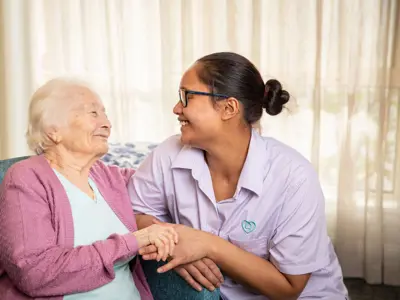
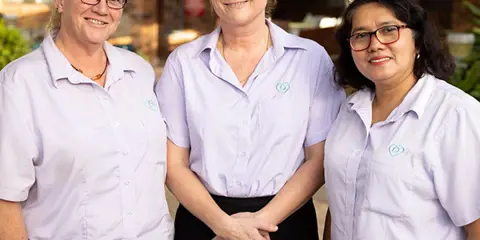
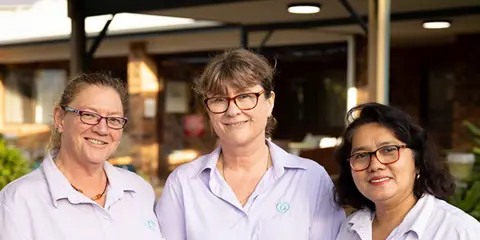
Palliative care and end-of-life care at Estia Health
Like all aspects of the care we offer, palliative and end-of-life care in our homes is person-centred, understanding the needs, preferences and things that are meaningful for each and every resident as they reach the last stage of their life. For the 10,000 residents we care for annually, although some will come to us for short-term respite care (accessing rehabilitation and reablement services) before moving home, many residents will receive palliative care and end-of-life care in our homes.
All members of our team are involved in providing compassionate care, including when a resident has entered the palliative care stage. Our clinical team will regularly assess a resident’s care plan to review any changes needed to care as well as discussing this with family members or significant others to help them understand and come to terms with the stage of life they are entering. Our chefs and their team may adapt meals based on changing preferences and abilities and our lifestyle team will look at all other aspects of care that supports a resident’s wishes, whether spiritual, cultural or emotional.
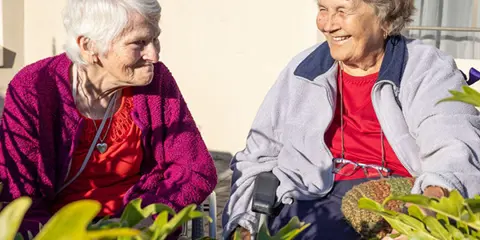
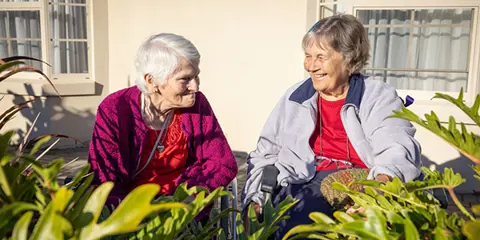
What is palliative care?
Palliative care aims to help people live as fully and as comfortably as possible when experiencing a life-limiting or terminal illness. This can include a progressive, or advanced disease, with little or no prospect of a cure. Many residents will be living with multiple conditions (referred to as co-morbidities) and require complex care, which is, delivered by our clinical care team in close collaboration with a GP, specialists and local community palliative care teams.
Every person’s care needs are different, which is why the care we deliver is tailored to every individual. Our approach to palliative care identifies and treats symptoms which may be physical, emotional and spiritual, respecting each person’s wishes, maintaining their dignity and supporting them at this incredibly important time in their lives.
35 percent of all Australians who die, will do so while living in a residential aged care home. For many of our residents, they see their Estia Health home as their final home and our team will work closely with them to ensure we meet their needs and wishes with compassion and dignity.


What is end-of-life care?
End-of-life care refers to the last few weeks of life, when a person with a life-limiting illness is approaching death. At this incredibly sad and difficult time, residents and their families receive increased support from our care team and specialist teams.
In addition to required medical care such as pain relief, care includes supporting cultural beliefs, following resident wishes, facilitating families coming together for difficult conversations and bereavement and grief support. Residents will be safe and comfortable in their room, a familiar place, surrounded by their belongings, with reminders of the life they’ve lived.
In our homes, our dedicated teams will guide families as they navigate this incredibly important stage and will look at ways to help the resident and family feel as comfortable as possible. A number of homes have special rooms or spaces for families and the team will supply meals and whatever comfort they can.
Frequently asked questions
-
How is palliative care and end-of-life care different?
Palliative care includes end-of-life care but it is much more, as it looks at the care and treatment required for anyone that has a serious illness where a cure or reversal of the disease and its progress is no longer possible.
The goal of palliative care is to help the person and their loved ones experience the best quality of life that they can, in the time they have left. This means that in addition to clinical and medical care, all aspects of a person’s care are involved to ensure they best meet with a person’s needs and wants.
End-of-life care is the final stage of palliative care as people enter the last few weeks and days of life. End-of-life care may begin when it’s clear a person is rapidly declining and there’s a significant change in their vital signs, increased fatigue or complete loss of appetite. At this stage, the focus very much becomes about the wishes of the resident, managing pain and maintaining their dignity.
-
Is palliative care just about pain management?
Palliative care is not just about pain management, but is focused on each individual and their family and loved ones - helping them have the best quality of life possible.
Palliative care will likely involve medication management, including pain management to relieve symptoms, but it will also include a broad range of care, including food and nutrition, mobility and sleeping, support for any emotional, social and spiritual concerns and counselling and grief support.At Estia Health, all members of our team are involved in providing compassionate care, including when a resident has entered the palliative care stage. Our clinical team will regularly assess a resident’s care plan to review any changes needed to care as well as discussing this with family members and loved ones to help them understand and come to terms with the stage of life their loved one is entering.
There may have already been conversations when a resident first moved into a home, but at this stage the team may discuss a resident’s wishes and recommend completing an advanced care plan. This involves making decisions ahead of time about the health care you would want to receive at the end of life or in the event of a medical crisis. The aim is that people feel they receive care as closely aligned to their wishes as possible and there is less conflict amongst family members from confusion as to their loved one’s wishes.
Our chefs and their team may adapt meals based on changing preferences and abilities and our lifestyle team will look at all other aspects of care that supports a resident’s wishes, whether spiritual, cultural or emotional.
As a resident’s condition continues to deteriorate reaching end-of-life, the care team will continue coordinating with any specialist teams such as community nurses and palliative care teams who specialise in administering certain medications. And at this stage, the teams will work closely with family to guide them through each day as their loved one’s condition changes.
-
Will I need to go to hospital?
Our care teams monitor residents' condition closely as they enter the palliative care or end-of-life care stage. There may be instances where a resident requires specialist or complex care that can only be delivered in a hospital and not in a residential aged care home. However, in many cases, the team will be able to organise the the relevant specialist care from community palliative care teams or GPs. For many people, their wish is to die at home, and although they may no longer be living in their own home, their residential aged care has become their home. It's where they’re surrounded by their belongings, friends, family, familiar faces, and our team who have often become like family to them.
For many residents in our care, in addition to administering the required pain management and other medications, much of this stage of care is centered around supporting residents, their families and loved ones to feel emotionally and spiritually supported as they navigate this challenging period.
-
Can family and friends stay in the home?
We will work closely with a resident’s family to provide as much support as is requested or needed at that time. Across our homes, each has their own facilities and some may be able to accommodate family members staying in separate rooms, or having a dedicated area to come together. Whether it’s asking for advice and guidance, a cup of tea or a friendly ear, our team will do their best to support you.
-
What is an Advance Care Plan?
Advance care planning involves making decisions ahead of time about the health care you would want to receive at the end of life or in a medical crisis.
Like many things in life, making decisions and thinking ahead to a difficult time like a medical crisis or the end of your life is both confronting and sad. However, making some decisions ahead of time, can mean a peace of mind that when the time comes, you know the people caring for you and your loved ones are clear on your choices and wishes.
In Australia, there are Advance Care Directives, which are formalised, legal documents that detail a person’s wishes, including the person who will make any decisions on their behalf, called a substitute decision-maker. As with many health care services, at Estia Health, we have an advance care directive program and will guide you through this process, when you first enter a home or as a resident requires palliative care.
-
Helpful palliative care resources and tools
The following peak bodies and organisations provide specialist palliative care and end-of-life support, guidance and resources:

